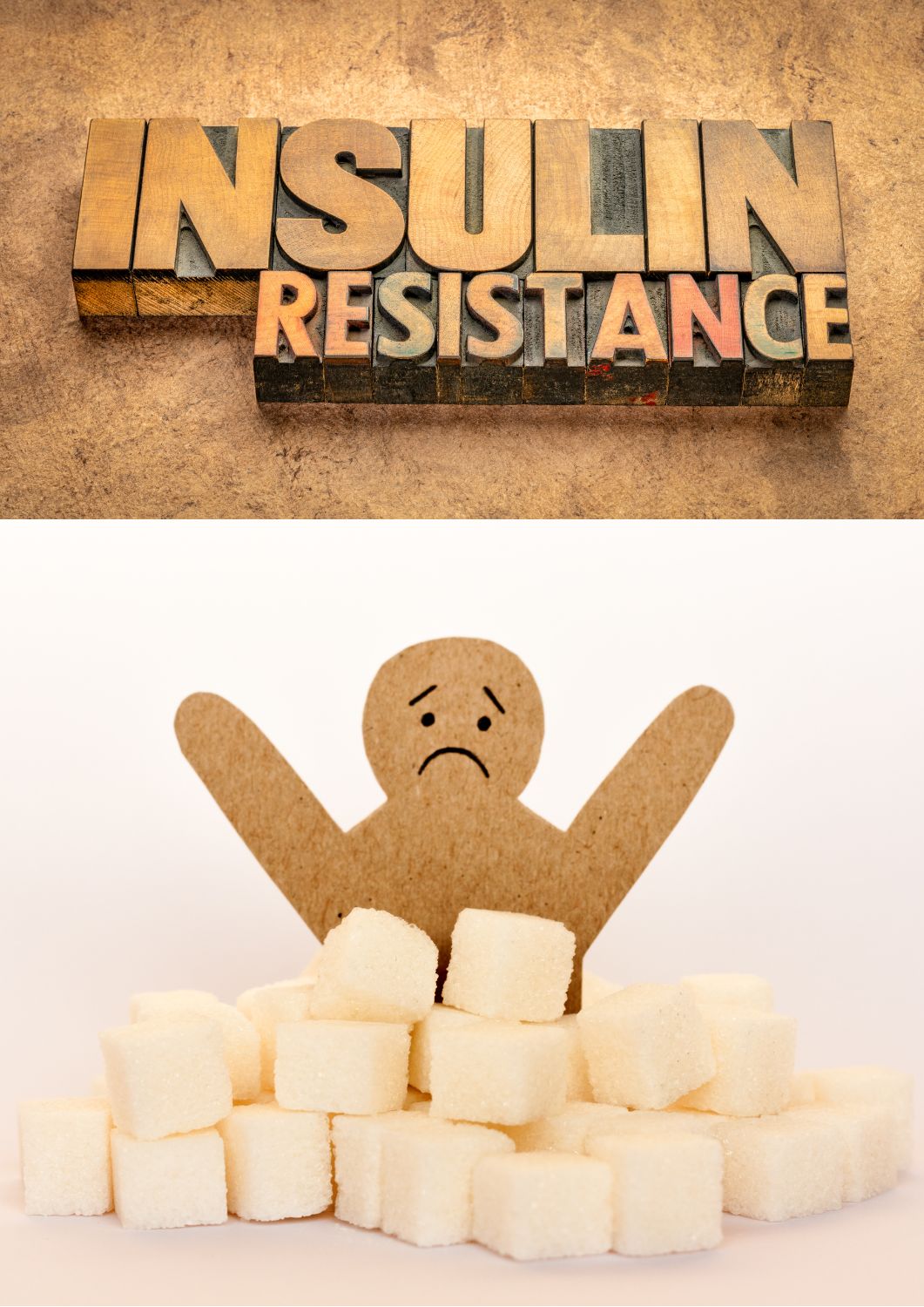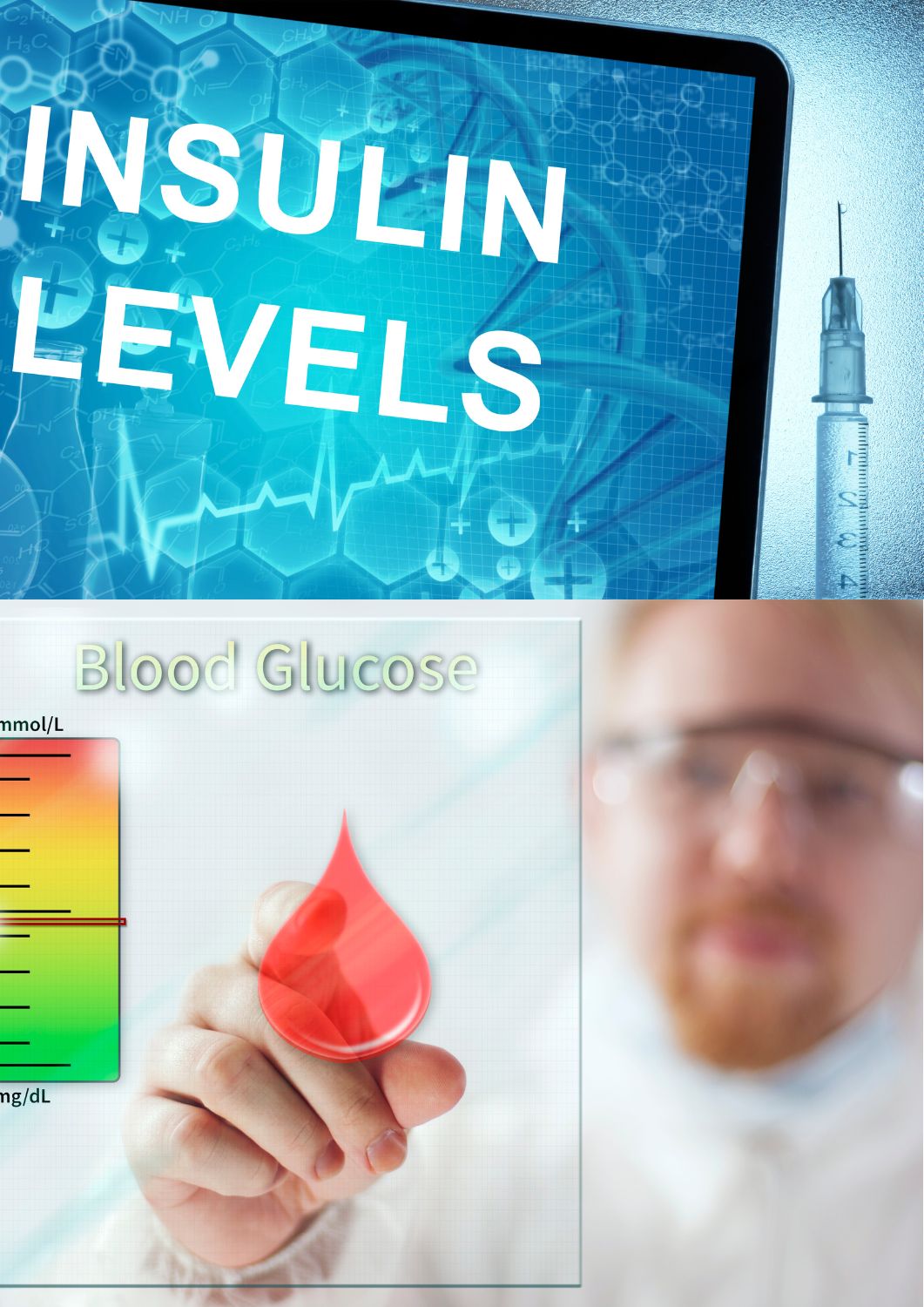Insulin Resistance:
This can destroy your health!
I found out about insulin resistance the hard way! In my journey through years of grappling with type 2 diabetes and the subsequent insulin resistance (IR), a profound realization has struck me: the vitality of maintaining optimal functions in our pancreas, liver, and gallbladder cannot be overstated if we aspire to lead long and thriving lives. This imperative becomes even more glaring when we consider the disconcerting quality of food pervasive in our grocery stores.
On this page, you'll discover:
- Insulin's Vital Role and the Unveiling of Insulin Resistance
- The Primary Cause of Insulin Resistance
- Recognizing the Symptoms Associated with Insulin Resistance
- How to repair Insulin Resistance in Your Body
- Insulin Resistance Doesn't Have to Control You
- Perseverance and Commitment to Better Health
The nexus between type 2 diabetes and heart disease is intricately woven through the fabric of insulin resistance—a metabolic disorder that has transcended borders to emerge as a significant global health concern. While sharing a common root cause with afflictions such as obesity and heart disease, insulin resistance, unfortunately, remains a clandestine health catastrophe. It silently affects millions, yet its recognition pales in comparison to the more mainstream conditions.
I've witnessed it firsthand, as have we all. Amidst the nutritionally deficient options that line grocery aisles, it is evident that comprehending the substantial influence of insulin resistance on our well-being is critical. Examining insulin's many uses and effects on human health—particularly in relation to diabetes—in detail is necessary to unravel the complexity of this illness.
In our quest to address the complexities posed by type 2 diabetes and heart disease, the task extends beyond addressing surface-level symptoms. It requires understanding the concealed intricacies of metabolism that intricately connect these health conditions. In a global landscape where the food we choose to consume significantly shapes our health trajectories, nurturing the functions of our pancreas, liver, and gallbladder emerges as a proactive strategy to safeguard our longevity and prosperity.

Insulin's Vital Role and the Unveiling of Insulin Resistance
Insulin secretion increases after a meal heavy in sugar and processed carbs. The constant increase in insulin in the modern diet is the cause of insulin resistance. It creates the groundwork for prediabetes and the first stages of type 2 diabetes, much like a domino effect.
This loop unintentionally increases insulin resistance by reducing the body's ability to respond to insulin. It represents a significant turning point in the history of metabolic health by highlighting the possible influence of dietary decisions on the complex functions of our bodies.
This is something you want to avoid at all costs if you really want to manage your type 2 diabetes!

The Primary Cause of Insulin Resistance
So, what's at the core of insulin resistance?
The primary instigator is the consumption of substantial quantities of processed and refined carbohydrates, leading to an escalation in insulin levels. Post a hefty meal, blood glucose levels surge, triggering the pancreas to kick into gear and produce more insulin.
Consequently, indulging in meals rich in glucose results in an uptick in insulin, fostering the progression of insulin resistance. It initiates a detrimental loop. To phrase it differently, an excessive intake of these foods prompts the pancreas to release more insulin, consequently raising blood sugar levels.
This perpetual loop serves as the origin of insulin resistance, prediabetes, and the initial phase of type 2 diabetes. The supporting evidence for this concept underscores the pivotal role of dietary choices in the evolution of insulin resistance. It accentuates the crucial nature of effective dietary management in breaking this pattern and reducing the risk of developing more severe health issues.
Consider insulin resistance as the inaugural signal in a chain reaction, a warning that potential health issues may emerge soon. Put another way, your body requires more insulin to aid in the absorption of glucose since your muscles, liver, and fat cells have lower insulin sensitivity.
Because of this, your pancreas works harder to generate more insulin to meet the increased demand, which starts a chain of events. This unhealthy loop amplifies the risk of developing type 2 diabetes and even prediabetes, fueled by the surge in insulin.
It emphasizes the imperative need for proactive measures and lifestyle adjustments to curb this escalating health threat. It's an alert, a crucial tipping point when the intricate equilibrium of the body is threatened, emphasizing how crucial it is to maintain insulin sensitivity for overall health and well-being. In response to this demand, the pancreas steps up to the plate, so to speak, and produces more insulin.
However, this well-intentioned response starts a potentially harmful cycle that might result in the onset of type 2 diabetes or prediabetes, the condition's precursor. It's a fine balance that highlights the complex interactions between insulin and the danger of metabolic health problems when it is upset.

Recognizing the Symptoms Associated with Insulin Resistance
Being able to identify the signs of insulin resistance early on is essential for proactive prevention and early identification. Thus, be on the lookout for those "red flags"! It's critical to identify symptoms including exhaustion, sleepiness after meals, belly fat buildup, raised triglycerides, and higher blood pressure. However, it's important to remember that not everyone suffering from insulin resistance may have all of these symptoms.
Regular blood sugar monitoring becomes crucial for those with a family history of diabetes or for those who maintain sedentary lifestyles. Taking this proactive approach is essential to remaining ahead of any connected issues. By detecting and treating insulin resistance early on, this awareness may be a valuable ally in promoting metabolic health in a proactive manner.
Treating insulin resistance might be difficult, but it is doable and achievable with natural approaches that target lifestyle decisions at their core. These adjustments may help control it as well as maybe shift its direction.

Let's Repair Insulin Resistance in Your Body!
Making the biggest and first diet adjustment is what you should do initially. Reduce, if not completely eliminate, your intake of processed sugar and carbohydrates. Many different meal plans include these nutrients, which raise blood sugar levels quickly and increase the need for insulin. Instead, make eating more lean meats, healthy fats, and fruits and vegetables rich in fiber your top priorities.
Increasing the intensity of your regular exercise regimen is essential for combating insulin resistance (IR). Frequent exercise, like walking, weightlifting, or running, makes cells more sensitive to insulin and speeds up the body's removal of excess blood sugar.
In conjunction with dietary and lifestyle modifications, intermittent fasting might be a useful strategy for managing and perhaps even curing insulin resistance. Introducing short fasts might help the body return to the optimal glucose-to-insulin ratio. However, before starting an intermittent fasting plan, see a physician.
Perhaps, while there is optimism that natural treatments may help manage or perhaps cure IR, it is crucial to see a doctor before stopping prescription medication. One of the key components of blood sugar management is prescription medicine.
In order to effectively manage insulin resistance, mental health issues and stress must be well treated. Extended periods of stress may raise cortisol levels, which can affect insulin synthesis and blood sugar levels. Therefore, putting mental health first is essential for a holistic plan that lowers insulin resistance.

Insulin Resistance Doesn't Have to Control You!
Insulin resistance doesn't have to dictate your life. By understanding its cause, recognizing its symptoms, and committing to disease management, you can regain control of your health. Remember, health isn't an overnight accomplishment; it is the culmination of consistent efforts towards healthier choices. This process may seem challenging initially, but your resilience will carve a path to your well-being.
Facing the uncertainties of the future with insulin resistance or type 2 diabetes can certainly evoke anxiety. However, taking a proactive approach towards disease management can bring peace of mind. The knowledge you gain and the control you assert over your condition significantly equip you to manage both current challenges and future uncertainties.
The journey toward healing and health raises the chances of experiencing frustration, confusion, and even loneliness. Remember that each step towards understanding how your body works—the interaction between food, insulin, and your health—equips you to manage this condition.
Understanding and managing diabetes and IR are significant undertakings, but they are not beyond you. There is an abundance of resources, guidance, and testimonials available that show the way to successfully manage these conditions and even reverse them.
You're not alone in dealing with insulin resistance. Millions of people worldwide grapple with this same condition, each with their own unique struggles and success stories. Draw strength from this collective experience and remember that every step towards healthier habits is a step towards defeating IR.
Gratitude and appreciation for the support you receive along the way act as crucial encouragement on this journey. This support may come from healthcare professionals, family, friends, or even the stories of strangers who were once where you are.

Acknowledge Your Perseverance and Commitment to Better Health!
Lastly, remember to love yourself through this process. No matter how little, every accomplishment should be acknowledged and recognized. Recognize your tenacity and dedication to leading a healthy lifestyle. It may be quite motivating and encouraging to see the progress you have made.
Taking control of insulin resistance means reclaiming your life's quality. Sure, it might seem overwhelming, and yes, it demands both discipline and commitment. Yet, the simple act of seizing control and charting a course toward better health opens the door to a life that's more fulfilling, richer, and inherently healthier.
In essence, tackling IR goes beyond the confines of mere blood sugar management. Embarking on this perpetual journey involves continuous self-discovery, heightened self-awareness, and fostering a dynamic connection with your body and overall well-being. Embracing this comprehensive approach lays the foundation for a more substantial and enduring transformation.
While fear and apprehension might initially define your journey, you will eventually navigate this unfamiliar territory. As you discover your body's unique responses to diet, exercise, and stress, your feelings will shift from confusion and information overload towards a genuine understanding of your body.
It really is empowering to be able to change. You'll feel more in charge of your health, your body, and eventually your life as you modify your diet, start exercising, and pick up stress-reduction skills.
It's normal to feel alone and face difficulties on a daily basis throughout this phase of transition and adjustment. Remember that this is a shared experience, and connecting with other individuals experiencing similar struggles can provide relief, strength, and inspiration.
Taking proactive measures to manage your insulin resistance instills an enduring sense of hope. Each breakthrough, every new understanding of your body's responses, serves as a beacon, illuminating your journey toward improved health and quality of life.
There's no denying that living with IR can be overwhelming. The prospect of lifelong medication, frequent blood glucose monitoring, dietary restrictions, and regular exercise can feel daunting. Remember, every small change adds up, paving the way toward improved health and a life less influenced by insulin resistance.
A diagnosis of IR often triggers a period of acceptance, a time of coming to terms with your new reality. It's essential to give yourself permission to feel these feelings, recognizing their part in your journey towards a healthier life.

Gratitude is a transformative emotion in any health journey, and in managing insulin resistance, this is no different. Appreciation for the support you garner, both professional and personal, can be a major pillar in your journey towards wellness and health.
Motivation can sometimes be challenging to come by, especially on tougher days. Keep in mind, each stride you make propels you farther from the clutches of IR and closer to a life filled with vitality. This journey isn't merely about extending the length of your life; it's about infusing your years with vigor and vibrancy.
Empowerment through knowledge is key. Grasping the intricacies of insulin resistance, comprehending its origins, unraveling its repercussions, and mastering its management can significantly diminish the anxiety and uncertainty that may cloud your outlook on the future. This knowledge equips you to manage current challenges and prepare for future uncertainties.
Maintaining hope and determination is paramount. Each day, the strides made by scientists in discovering the complexities of IR and diabetes contribute to enhanced treatments and a deeper comprehension of disease management. These breakthroughs, in turn, hold the promise of elevating your quality of life, effectively managing insulin resistance, and forging a path toward a healthier and more vibrant future.
Insulin Resistance Page Take-Away!
- Insulin Resistance: The Silent Epidemic of World Health Understanding how important the liver, gallbladder, and pancreas are in reducing insulin resistance The link between IR and heart disease and type 2 diabetes, which is sometimes obscured by more common ailments. Impact of contemporary processed foods on insulin levels, which might result in a hazardous loop with negative health effects.
- Comprehending Insulin Resistance: A Chain Reaction Insulin resistance is the result of consistently high insulin levels brought on by diets high in processed carbohydrates and sugar. The cascade effect: an increase in insulin, a decrease in sensitivity, a rise in the need for insulin, and the foundation for diabetes. Insulin resistance highlights the delicate balance of metabolic health and serves as a warning flag.
- How to Identify and Treat Insulin Resistance: Early identification by looking for signs such as high blood pressure, lethargy, raised triglycerides, belly fat, and sleepiness after meals. Blood sugar monitoring is crucial, particularly for those who live sedentary lifestyles or have a family history of the condition. There is a need to treat insulin resistance immediately in order to stop type 2 diabetes and prediabetes from developing.
- Methods of Living to Control Insulin Resistance Dietary changes: drastically cut down on refined sugars and processed carbohydrates and emphasize lean proteins, healthy fats, and foods high in fiber.
- Frequent physical activity: Exercise is essential for improving insulin sensitivity and controlling blood sugar levels. When done carefully and under guidance from a specialist, intermittent fasting may help manage and perhaps even reverse insulin resistance.
- An Inspiring Path to Regaining Health: overcoming insulin resistance naturally, with a key component being lifestyle modifications. Recognizing the characteristics of insulin resistance that may be controlled while keeping prescription medicine in mind. Maintaining mental well-being and controlling stress are essential components of treating insulin resistance.
- Encouraging and Self-Reliant Despite Insulin Resistance: adopting a proactive approach to managing illness in order to achieve future health and peace of mind. Acknowledging that millions of people suffer from insulin resistance and finding strength in the experiences of one another.
Embracing self-love, cultivating appreciation, and celebrating little wins along the difficult but powerful path.Essentially, the fight against insulin resistance is a transforming path towards comprehensive empowerment and well-being rather than only controlling blood sugar.